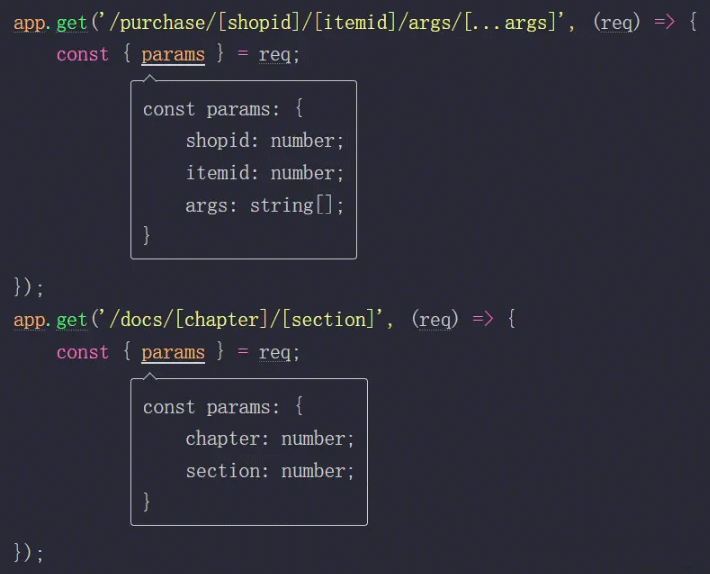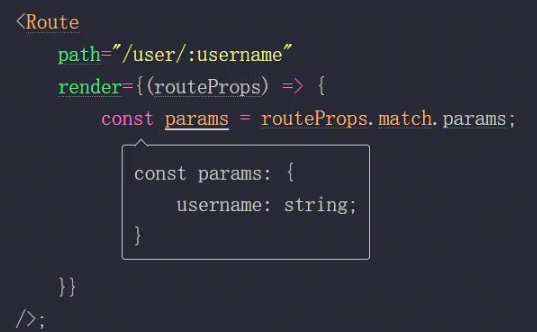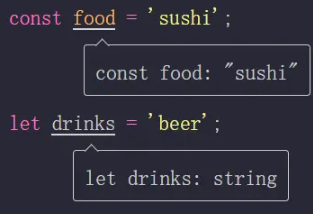利用TypeScript从字符串字面量类型提取参数类型
目录
- 正文
- 挑战
- 需要掌握的内容
- 字符串字面量类型
- 模板字面量类型和字符串字面量类型
- 条件类型
- 函数重载和通用函数
- 着手解决问题
- 分割字符串字面量类型
- 参数语法部分的过滤
- 在对象类型里做一个映射
正文
挑战
我们先来做一个ts的挑战。
你知道如何为下面的app.get方法定义TypeScript类型吗?

req.params是从传入的第一个参数字符串中提取出来的。
当你想对一个类似路由的函数定义一个类型时,这显得很有用,你可以传入一个带路径模式的路由,你可以使用自定义语法格式去定义动态参数片段(例如:[shopid]、:shopid),以及一个回调函数,它的参数类型来源于你刚刚传入的路由。
所以,如果你尝试访问没有定义的参数,将会报错!

举一个真实案例,如果你对React Router很熟悉,应该知道render函数中的RouteProps的类型是从path参数派生出来的。

本文将探讨如何定义这样一个类型,通过各种ts技术,从字符串字面量类型中提取类型。
需要掌握的内容
首先,在我们探讨之前,需要先讲下一些基本的知识要求。
字符串字面量类型
ts的字符串类型是一个可以有任何值的字符串
let str: string = 'abc'; str = 'def'; // no errors, string type can have any value
而字符串字面量类型是一个具有特定值的字符串类型。
let str: 'abc' = 'abc'; str = 'def'; // Type '"def"' is not assignable to type '"abc"'.
通常情况下,我们将它与联合类型一起使用,用来确定你可以传递给函数、数组、对象的字符串取值的列表。
function eatSomething(food: 'sushi' | 'ramen') {}
eatSomething('sushi');
eatSomething('ramen');
eatSomething('pencil'); // Argument of type '"pencil"' is not assignable to parameter of type '"sushi" | "ramen"'.
let food: Array<'sushi' | 'ramen'> = ['sushi'];
food.push('pencil'); // Argument of type '"pencil"' is not assignable to parameter of type '"sushi" | "ramen"'.
let object: { food: 'sushi' | 'ramen' };
object = { food: 'sushi' };
object = { food: 'pencil' }; // Type '"pencil"' is not assignable to type '"sushi" | "ramen"'.
你是如何创建字符串字面量类型的呢?
当你使用const定义一个字符串变量时,它就是一个字符串字面量类型。然而,如果你用let去定义它,ts识别出变量的值可能会改变,所以它把变量分配给一个更通用的类型:

同样的情况对对象和数组也一样,你可以在以后去修改对象、数组的值,因此ts分配给了一个更通用的类型。

不过,你可以通过使用const断言向ts提示,你将只从对象、数组中读取值,而不会去改变它。

模板字面量类型和字符串字面量类型
从ts4.1开始,ts支持一种新的方式来定义新的字符串字面量类型,就是大家熟悉的字符串模板的语法:
const a = 'a';
const b = 'b';
// In JavaScript, you can build a new string
// with template literals
const c = `${a} ${b}`; // 'a b'
type A = 'a';
type B = 'b';
// In TypeScript, you can build a new string literal type
// with template literals too!
type C = `${A} ${B}`; // 'a b'
条件类型
条件类型允许你基于另一个类型来定义一个类型。在这个例子中,Collection<X>可以是number[]或者Set<number>,这取决于X的类型:
type Collection<X> = X extends 'arr' ? number[] : Set<number>; type A = Collection<'arr'>; // number[] // If you pass in something other than 'arr' type B = Collection<'foo'>; // Set<number>
你使用extends关键字用来测试X的类型是否可以被分配给arr类型,并使用条件运算符(condition ? a : b)来确定测试成立的类型。
如果你想测试一个更复杂的类型,你可以使用infer关键字来推断该类型的一部分,并根据推断的部分定义一个新类型。
// Here you are testing whether X extends `() => ???` // and let TypeScript to infer the `???` part // TypeScript will define a new type called // `Value` for the inferred type type GetReturnValue<X> = X extends () => infer Value ? Value : never; // Here we inferred that `Value` is type `string` type A = GetReturnValue<() => string>; // Here we inferred that `Value` is type `number` type B = GetReturnValue<() => number>;
函数重载和通用函数
当你想在ts中定义一个参数类型和返回值类型相互依赖的函数类型时,可以使用函数重载或者通用函数。
function firstElement(arr) {
return arr[0];
}
const string = firstElement(['a', 'b', 'c']);
const number = firstElement([1, 2, 3]);
// return string when passed string[]
function firstElement(arr: string[]): string;
// return number when passed number[]
function firstElement(arr: number[]): number;
// then the actual implementation
function firstElement(arr) {
return arr[0];
}
const string = firstElement(['a', 'b', 'c']);
// Define type parameter `Item` and describe argument and return type in terms of `Item`
function firstElement<Item>(arr: Item[]): Item | undefined {
return arr[0];
}
// `Item` can only be of `string` or `number`
function firstElement<Item extends string | number>(arr: Item[]): Item | undefined {
return arr[0];
}
const number = firstElement([1, 3, 5]);
const obj = firstElement([{ a: 1 }]); // Type '{ a: number; }' is not assignable to type 'string | number'.
着手解决问题
了解了以上知识,我们对于问题的解决方案可能可以采取这样的形式:
function get<Path extends string>(path: Path, callback: CallbackFn<Path>): void {
// impplementation
}
get('/docs/[chapter]/[section]/args/[...args]', (req) => {
const { params } = req;
});
我们使用了一个类型参数Path(必须是一个字符串)。path参数的类型是Path,回调函数的类型是CallbackFn<Path>,而挑战的关键之处就是要弄清楚CallbackFn<Path>。
我们计划是这样子的:
- 给出
path的类型是Path,是一个字符串字面量类型。
type Path = '/purchase/[shopid]/[itemid]/args/[...args]';
- 我们派生出一个新的类型,这个类型将字符串分解成它的各个部分。
type Parts<Path> = 'purchase' | '[shopid]' | '[itemid]' | 'args' | '[...args]';
- 筛选出只包含参数的部分
type FilteredParts<Path> = '[shopid]' | '[itemid]' | '[...args]';
- 删除不需要的括号
type FilteredParts<Path> = 'shopid' | 'itemid' | '...args';
- 将参数映射到一个对象类型中
type Params<Path> = {
shopid: any;
itemid: any;
'...args': any;
};
- 使用条件类型来定义map的值部分
type Params<Path> = {
shopid: number;
itemid: number;
'...args': string[];
};
- 重置键名,删除
...args中的...
type Params<Path> = {
shopid: number;
itemid: number;
args: string[];
};
最后
type CallbackFn<Path> = (req: { params: Params<Path> }) => void;
分割字符串字面量类型
为了分割一个字符串字面量类型,我们可以使用条件类型来检查字符串字面量的取值:
type Parts<Path> = Path extends `a/b` ? 'a' | 'b' : never; type AB = Parts<'a/b'>; // type AB = "a" | "b"
但是要接收任意字符串字面量,我们无法提前知道是什么值
type CD = Parts<'c/d'>; type EF = Parts<'e/f'>;
我们必须在条件测试中推断出数值,并使用推断出来的数值类型:
type Parts<Path> = Path extends `${infer PartA}/${infer PartB}` ? PartA | PartB : never;
type AB = Parts<'a/b'>; // type AB = "a" | "b"
type CD = Parts<'c/d'>; // type CD = "c" | "d"
type EFGH = Parts<'ef/gh'>; // type EFGH = "ef" | "gh"
而如果你传入一个不匹配模式的字符串字面量,我们希望直接返回:
type Parts<Path> = Path extends `${infer PartA}/${infer PartB}` ? PartA | PartB : Path;
type A = Parts<'a'>; // type A = "a"
有一点需要注意,PartA的推断是'non-greedily'的,即:它将尽可能地进行推断,但不包含一个/字符串。
type ABCD = Parts<'a/b/c/d'>; // type ABCD = "a" | "b/c/d"
因此,为了递归地分割Path字符串字面量,我们可以返回Parts<PathB>类型替代原有的PathB类型:
type Parts<Path> = Path extends `${infer PartA}/${infer PartB}` ? PartA | Parts<PartB> : Path;
type ABCD = Parts<'a/b/c/d'>; // type ABCD = "a" | "b" | "c" | "d"
以下是所发生的详细复盘:
type Parts<'a/b/c/d'> = 'a' | Parts<'b/c/d'>; type Parts<'a/b/c/d'> = 'a' | 'b' | Parts<'c/d'>; type Parts<'a/b/c/d'> = 'a' | 'b' | 'c' | Parts<'d'>; type Parts<'a/b/c/d'> = 'a' | 'b' | 'c' | 'd';
参数语法部分的过滤
这一步的关键是观察到,任何类型与never类型联合都不会产生类型
type A = 'a' | never; // type A = "a"
type Obj = { a: 1 } | never; // type Obj = { a: 1; }
如果我们可以转换
'purchase' | '[shopid]' | '[itemid]' | 'args' | '[...args]'
成
never | '[shopid]' | '[itemid]' | never | '[...args]'
那我们就可以得到:
'[shopid]' | '[itemid]' | '[...args]'
所以,要怎么实现呢?
我们得再次向条件类型寻求帮助,我们可以有一个条件类型,如果它以[开始,以]结尾,则返回字符串字面量本身,如果不是,则返回never:
type IsParameter<Part> = Part extends `[${infer Anything}]` ? Part : never;
type Purchase = IsParameter<'purchase'>; // type Purchase = never
type ShopId = IsParameter<'[shopid]'>; // type ShopId = "[shopid]"
type IsParameter<Part> = Part extends `[${infer Anything}]` ? Part : never;
type FilteredParts<Path> = Path extends `${infer PartA}/${infer PartB}` ? IsParameter<PartA> | FilteredParts<PartB> : IsParameter<Path>;
type Params = FilteredParts<'/purchase/[shopid]/[itemid]/args/[...args]'>; // type Params = "[shopid]" | "[itemid]" | "[...args]"
删除括号:
type IsParameter<Part> = Part extends `[${infer ParamName}]` ? ParamName : never;
type FilteredParts<Path> = Path extends `${infer PartA}/${infer PartB}` ? IsParameter<PartA> | FilteredParts<PartB> : IsParameter<Path>;
type ParamsWithoutBracket = FilteredParts<'/purchase/[shopid]/[itemid]/args/[...args]'>;
在对象类型里做一个映射
在这一步中,我们将使用上一步的结果作为键名来创建一个对象类型。
type Params<Keys extends string> = {
[Key in Keys]: any;
};
const params: Params<'shopid' | 'itemid' | '...args'> = {
shopid: 2,
itemid: 3,
'...args': 4,
};
type IsParameter<Part> = Part extends `[${infer ParamName}]` ? ParamName : never;
type FilteredParts<Path> = Path extends `${infer PartA}/${infer PartB}` ? IsParameter<PartA> | FilteredParts<PartB> : IsParameter<Path>;
type Params<Path> = {
[Key in FilteredParts<Path>]: any;
};
type ParamObject = Params<'/purchase/[shopid]/[itemid]/args/[...args]'>;
最终版:
type IsParameter<Part> = Part extends `[${infer ParamName}]` ? ParamName : never;
type FilteredParts<Path> = Path extends `${infer PartA}/${infer PartB}` ? IsParameter<PartA> | FilteredParts<PartB> : IsParameter<Path>;
type ParamValue<Key> = Key extends `...${infer Anything}` ? string[] : number;
type RemovePrefixDots<Key> = Key extends `...${infer Name}` ? Name : Key;
type Params<Path> = {
[Key in FilteredParts<Path> as RemovePrefixDots<Key>]: ParamValue<Key>;
};
type CallbackFn<Path> = (req: { params: Params<Path> }) => void;
function get<Path extends string>(path: Path, callback: CallbackFn<Path>) {
// TODO: implement
}
到此这篇关于利用TypeScript从字符串字面量类型提取参数类型的文章就介绍到这了,更多相关TS取参数类型内容请搜索我们以前的文章或继续浏览下面的相关文章希望大家以后多多支持我们!

